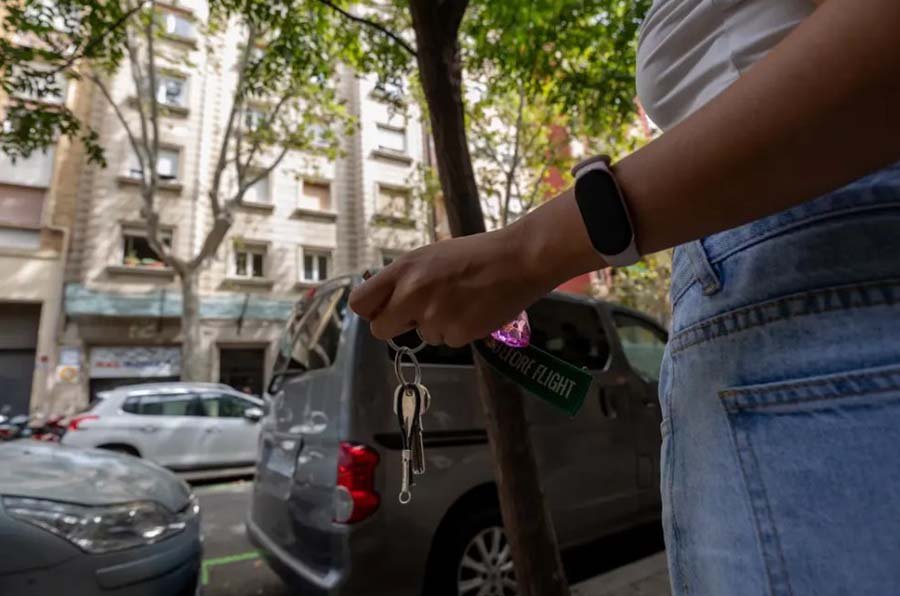More than 40 People Defrauded in Barcelona Rental Scam

Photo: 20minutos.es
In Barcelona, police are investigating a large-scale rental market fraud. More than 40 people have fallen victim to a Brazilian citizen who posed as the owner of an apartment, reports 20 Minutos. He signed agreements, handed over keys, collected deposits and advance payments, and then disappeared – he is now on the wanted list.
Among the victims of the man known as Pablo were students and young professionals who had just arrived in the city. The scammer advertised the property through the popular Badi app, offering the same five-bedroom flat. Rooms were priced at €500 each, or €1,800 for the whole place. He claimed to be occupying the living room, which was locked, and confidently posed as the landlord, showing contracts and an ID card.
One young woman on August 29 moved in clothes, shoes, personal items, and even a new Ikea wardrobe. But just two days later she found the door jammed from inside and encountered dozens of other tenants in the hallway. Later she managed to retrieve only part of her belongings, helped by one of the residents. When Sara returned again, she found an empty suitcase and bags of cheap clothes left on the staircase. Inside the apartment, people insisted they had also paid for the rental and even threatened: “If you come back, we will kill you.” On top of that, she was splashed with water from a window.
Another victim paid €200 in cash and transferred another €300 to an IBAN, receiving a contract and access keys. He was assured that the apartment had previously been rented short-term on Airbnb until September, but six-month renewable contracts were now planned. On August 31 he arrived with a van and his belongings, but found other deceived tenants in the stairwell. The entrance was blocked and threats came from inside. “People were crying at the doorway, not knowing where to spend the night,” he recalls.
Martin handed over €550 and was also given keys. He said the ad on Badi listed “Ricardo,” but the viewing was conducted by Pablo. The tenant tried to move in but was confronted by an aggressive young man on a scooter who shouted threats. Inside, there was chaos, luggage everywhere, and several young women who didn’t know where to sleep.
The victims quickly organized: the same day they created a WhatsApp group, sharing Pablo’s details, receipts, photos, and copies of agreements. They discovered the pattern was identical: papers, keys, sometimes a receipt, and various payment methods. In total, 42 people joined the chat, though many believe the number of victims is higher – some may have arrived, not met anyone, and simply left.
Police of the autonomous community of Catalonia (Mossos d’Esquadra) confirmed they had opened a case and issued an arrest warrant. The suspect already has several fraud convictions. Law enforcement said they expect to catch him fairly quickly. At the same time, they refused to accept separate theft complaints regarding belongings, citing the high number of reports already filed.
Neighbors told reporters that Pablo often visited the apartment and even mentioned plane tickets. This convinced many that he lived in the building regularly, not occasionally. “Everything looked very organized,” the victims note. While some managed to temporarily stay in their old apartments or with friends, others were effectively left on the street, with their belongings packed away in storage rooms.
Fraudsters in Spain also use other methods of rental scams. Among them are fake ads created with neural networks, reports ABC. Sometimes the properties do not even exist: AI image generators produce “ideal apartments.” Prices are listed significantly below market level, sparking interest and creating a sense of unique opportunity. Initial contacts occur through legitimate platforms, which boosts trust, but scammers quickly move conversations to messengers, where platform oversight disappears.
From there, the scheme unfolds in the classic way: the victim is asked for a prepayment to “reserve” or cover a “deposit,” with the promise of paperwork later. After the transfer, the listing is deleted, the profile disappears, and the tenant is left with nothing. Experts note that the strength of such scams lies in their professional execution: the listings look so convincing that “anyone can fall for it.”
Warning signs may include spelling mistakes in the text, overly glossy or generic photos, refusal to show the apartment in person, or pressure to pay immediately. Scammers play on the psychological effect: “there are many interested,” “decide right now.” This fear of missing out becomes their main tool for securing quick prepayments.
Victims often trust precisely because everything looks too realistic, but that is the danger: the schemes are becoming more professional and well-disguised as market offers. Recommended precautions include checking properties in official registries, using reverse image searches, and demanding official documents. Money should not be transferred before an in-person viewing or reliable confirmation of the deal.
According to Catalonia’s police (Mossos d’Esquadra), fake rental fraud ranks fifth among the most common scams, behind only phone and SMS fraud and phishing, which together account for 60% of all complaints.
Подсказки: Barcelona, Spain, rental scam, apartment fraud, rental housing, Catalonia, Badi app, housing market Spain, property scam, tenants








